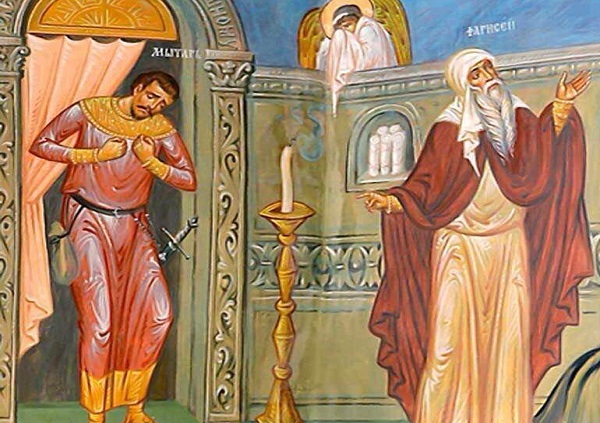Genuine Devotion and Tainted Piety (2 Tim. 3, 10-15)
15 February 2022As we enter the reflective period of the Triodio, the Church urges us to remember the clear distinction between genuine devotion and tainted piety. At the beginning of this spiritual struggle, which will soon intensify with our entry into Great Lent, the Church reminds us of the dangers of the aberration of hypocrisy, which threatens to negate all our efforts towards the cultivation of the virtues. This is mentioned not only in the Gospel reading, with the parable of the Pharisee and the Publican which castigates this danger in detail. In identical tones, the Epistle reading for the day transmits the same message: the need for vigilance, so that you don’t fall into tainted piety.

Pharisee with the outlook of the publican
A little earlier in the same (third) chapter of his second epistle to Timothy, Saint Paul refers to those who ‘have a form of godliness but deny its power’. And speaking of them in the harshest language, he calls them: ‘men of corrupt minds, untested as regards the faith’. He urges Timothy to avoid them.
In contrast to these supposedly ‘pious’ Christians, Saint Paul is forced to refer to himself, though without any Pharisaical self- aggrandizement. In another one of his epistles, of course, he’s not shy about confessing that he had been ‘in regard to the law, a Pharisee’ (Phil. 3, 5) and ‘as for righteousness based on the law, faultless’ (3, 6). But all of that which he’d once considered profit, he considered a loss, now that he believed in Christ (3,7). It would therefore be unjust to level the charge of Pharisaism at the Holy Apostle, who surpasses in humility the publican of the parable, saying he was ‘born out of time’ (1 Cor. 15, 8) and that he is the first among sinners (1 Tim. 1, 15). And so, certain that Timothy wouldn’t misinterpret the references to his labors, he reminds him of their common progress thus far.
The criteria for genuine devotion
Their path was a rich experience of the common apostolic life, during which Timothy had every opportunity to see for himself whether Paul’s devotion was tainted or genuine. He became replete with Paul’s untainted teaching, he saw his bright example, he lived his fervent faith, understood his good intentions, experienced his tolerance and genuine love and, finally, admired his inexhaustible patience. He knew about the persecution in Antioch, Pisidia, where the Jews incited the local leaders to expel the apostles Barnabas and Paul ‘from within their borders’. He remembered that, in Iconium, they had planned to stone him, a fate he later met in Lystra, where they dragged him out of the town and left him for dead.
It’s clear, then, that, for Timothy- and this is confirmed by Saint John Chrysostom, Saint Paul ‘was neither vain nor ambitious. He enumerates everything, not in order to show off, but to comfort and support his child’. Besides, how could there be any accommodation between the unhealthy elation and boasting of a hypocrite and the genuine love of the apostle for his sufferings in Christ. The authentic interpreter of the words of Sant Paul, Saint John Chrysostom, renders the message of the spiritual father to his child with great clarity: ‘From all I’ve been through, you should learn that it’s not possible to avoid sorrows if you’re fighting against evil. For those who are really striving, it makes no sense to live in opulence and comfort. The time for ease is not now. Now’s the time for struggles, sorrows and temptations’. But through this sweat and labor you’ll achieve real progress in patience, faith, in love and all the real virtues.
Unwavering commitment to the steps of genuine teachers
The wicked and the hypocrites will ‘prosper’, going from bad to worse. And what’s worse than deceiving not only other people, but also themselves? The wicked and the impostors may prosper numerically, since stoking the passions, particularly those of arrogance and pride, beguiles and seduces. Saint Paul makes this point later in the epistle to Timothy. He warns: ‘For the time will come when people will not put up with sound doctrine. Instead, to suit their own desires, they will gather around them a great number of teachers to say what their itching ears want to hear’.
Despite this, those who are really working for the Gospel should not be disheartened: ‘But as for you, continue in what you have learned and have become convinced of, because you know those from whom you learned it’. He reminds him that he was nourished from early infancy, having the devout Evniki and Loïda as mother and grandmother. But the teacher who made the definitive difference was Saint Paul himself. He was the best possible instructor, who combined not merely the deeds of an exemplary Pharisee with the humble outlook of the Publican, but also the sufferings of one of the leading apostles ‘on behalf of everyone’, with his perfect love. A love which led him to say: ‘For I could wish that I myself were cursed and cut off from Christ for the sake of my people, those of my own race’.






